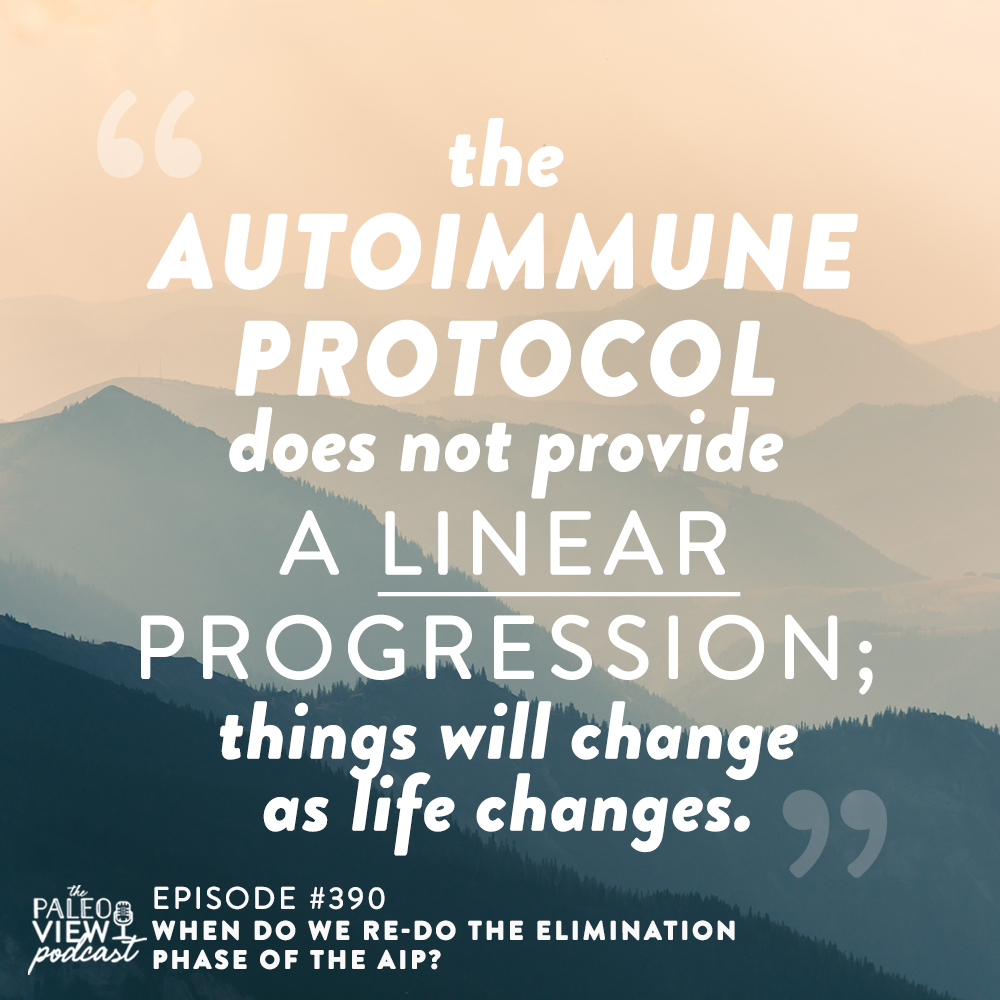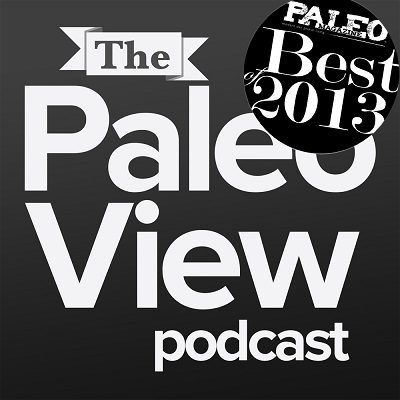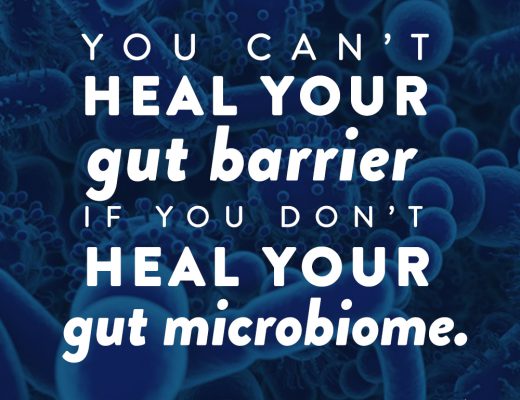
On this week’s episode, Stacy and Sarah address a listener’s question on how to handle setbacks along an AIP journey. When should an individual go back to the elimination phase? And how do you manage the stress that comes with setbacks? Answers to these questions and more in episode 390!
If you enjoy the show, please review it on iTunes!
The Paleo View (TPV), Episode 390: When do we re-do the elimination phase of the AIP?
Welcome back to the Paleo View, episode 390! (0:40)
Stacy has fully recovered and has finally found her groove in life again.
For Stacy, routine brings her a lot of joy.
She feels like she has been working the work-from-home mom life!
Sarah is coming out of a kid activity focused weekend, which was very busy.
Robotics club has taken over, and Sarah is looking forward to soon getting back into their normal routine.
Sarah took a proud mama moment to share on her daughter’s latest accomplishments.
This week’s show is inspired by another great listener question.
Q & A
Mackenzie says, “I first just want to say your podcast is my go-to for everything in my life! (7:40)
I now live for my Thursday afternoons so I can listen to the newest podcast!!
My question to you is: I did AIP and reintroduced many foods.
Now I’m basically paleo with few other exceptions, but I recently had blood work done and my DHEA and thyroid levels have dropped.
I’m working with my naturopath now to get back to my normal, but I didn’t know what I could do at home to help as well.
Should I go back to the elimination phase of AIP? Any help would be great. Thank you in advance!!
Stacy wants to first reiterate that we all go through these phases in life when stress and different lifestyle factors affect how our body reacts to what it can tolerate.
Every person who has done this process goes through this challenge at some point in their life.
Stacy and Sarah both also feel that it is common to see people get test results that aren’t reflective of any symptoms they are experiencing.
This makes it difficult to know what to eliminate when you don’t have symptoms to manage.
One of the amazing things about the autoimmune protocol is that the structure of it is set up so that we can really learn about our own bodies and triggers.
We learn our own tolerances to the individual foods that have been eliminated.
Really going through the autoimmune protocol and going through reintroductions methodically allows you to take this as a learning experience.
Re-Introduction
What do you do when you experience a trigger? (11:09)
In an ideal situation, we have learned what works really well for us from our reintroduction phase.
We incorporate these foods on a daily basis and feel really good consuming them on a regular basis.
Then there is a second group of foods that are sometimes foods, that we tolerate when everything else is dialed in.
When we are eating a nutrient-dense diet, our stress is managed and our activity levels are appropriate, these foods don’t affect us.
However, when anything starts to slip, our body will act negatively to the sometimes foods.
If Mackenzie has a good grasp on that list of sometimes foods, Sarah recommends that instead of going back to the beginning of the elimination process, to refer to that list.
Then take out the sometimes foods, the foods we know aren’t helping us.
On the flip side, it can be common for people to start out with a methodical reintroduction process, but then have so many successes that it turns into a free-for-all.
If this resonates with you, don’t feel bad. This is a very common experience.
Don’t feel like you have failed reintroductions if this is what happens to your reintroduction process.
If you are in a position where you don’t know what foods you’ve reintroduced are completely working for you, versus sometimes food, and you are faced with a health set back, you may need to go back to full elimination.
As you recover from the health set back, take that as your opportunity to be more methodical about reintroduction.
So the next time, and there will be a next time, you will have the food classifications that will help inform you what to do when you have a setback.
A Third Scenario
There is a common third situation as well.
Is there a facet of the autoimmune protocol where the focus on implementation can be more carefully monitored.
The nutrient-density piece can be a stumbling block for a lot of people.
An aversion to organ meat, shellfish or even to vegetables and fruit outside of a core group, can be fairly common.
The other approach to a health setback is to have a look at this maintenance AIP and evaluate the core principles.
Is there a core principle that you are not implementing to the best of your ability?
Is there an area where extra focus and/or commitment could be used?
Nutrient-density is one possible area.
You could not be eating enough fruits and vegetables, organ meats, seafood, letting your sugar intake slide, not be getting enough fermented foods, etc.
If you are trying to lose weight, you could also have too big of an energy deficit that is negatively impacting you.
This could mess with your hormones and drive inflammation.
You could be eating too few carbs.
Pay attention to the micronutrients, pay a little bit attention to the macronutrients, and take a look at your diet.
Are you getting the nutrients that your body needs?
This question should be asked regardless of whatever diet you are following.
Getting the nutrients that our body needs for all of the chemical reactions happening in our body is the primary criteria of whether or not a diet is a health-promoting diet.
Bioindividuality is reflected in intolerances to food toxins and antinutrients.
Collecting Personal Data
Sarah likes to periodically check-in and do a two or three-day food journal.
She uses an app called Cronometer.
This allows Sarah to check in on her intake to see if she is meeting her body’s nutritional needs.
We can still maintain a focus on nutrient density and sufficiency even with lots of successful reintroductions.
Meal timing is also an important thing to pay attention to.
Are you eating breakfast? Are you grazing?
For hormone regulation, it is better to eat distinct meals and have a five-hour space between them.
If you are eating too close to bedtime, that can also interrupt sleep.
Don’t just look at the foods on your plate, also look at how you are balancing them together to form complete meals, and eating them at separate time points can support healing as well.
Then there are all the activity and lifestyle things to look at.
For Sarah, her flairs are always driven by lifestyle factors slipping.
High stress is her trigger, but all of her lifestyle stuff falls apart together.
Eventually, these things will impact her diet as well, because they are all linked together.
Take a good look if there is something that has impacted your diet and lifestyle choices?
Have you let some aspect of the AIP lifestyle slide?
Have external factors influenced your ability to implement the AIP lifestyle?
Take a critical self-reflection at how you are implementing the key principles of AIP and take a look if there is something you can dial back in.
Another Piece to Look At
Compliance consistency with medications and supplements is another piece of the puzzle to look at.
Very commonly on AIP, we are working with healthcare providers that have a root cause approach to supporting our health.
They will have likely recommended a prescription medication or a supplement regimen in order to address an underlying factor that is contributing to our health factors. (26:17)
It is human nature that the better you feel, the more likely you are to skip doses or forget.
If you feel good, it is easy to forget the thing that helped you get there.
Sometimes it is appropriate to wean off of medications and supplements, but you would do that under medical supervision so that your doctor is monitoring you for potential problems.
If you want to try to discontinue any of your medications or supplements, talk to your healthcare provider.
When we aren’t consistent with our medications and supplements, there is a slow erosion process that we don’t realize until we are pretty far down the path.
This is another space where you need to ask yourself, are you doing the things you know you need to do to support your best health?
You can answer this question by going back to full AIP with a full elimination phase.
You could also cut out the sometimes foods and see how you feel after removing those.
Lifestyle Factors
Or you could go back to the lifestyle components, specifically the stress and sleep, and focus on fine-tuning those.
Stacy took a moment to clarify the different kinds of stresses that can be on your body.
Over the last few months, Stacy put stress on her body when she traveled by plane, got a tattoo, and got the flu.
There are things that happen to your body that you cannot simply correct by going to yoga.
When you are thinking about your life, it is more than just deadlines, bills and teenagers that are causing you stress.
Stress is broadly defined into four categories.
There are psychological stressors, physical stressors, sensory stressors, and environmental stressors.
Sarah shared a bit about her health setback and the many stressors that compounded to cause that setback.
She is still working to recover, and it will continue to be a long road ahead.
Some stress we think we have no control over, but we do.
Other stressors we know we have control over, and there are other things that we have no control over.
It is important to be as proactive in our stress management as we can be.
Give yourself grace and remember that sometimes things happen beyond our control.
Try your best to respond and not react during these times.
Stress is such an important piece of the puzzle that is hard to recognize until we have taken it seven steps too far.
It is also one of the hardest hurdles to overcome when stress is driving a health setback.
Stacy shared a bit more on her experience, and an important lesson and triggers. (39:53)
If you can’t feel additional stress in a way that affects you, it means you already have too much stress on your plate.
This is something we all have to work on and it changes and evolves as our life changes.
There is no shame in needing to go back to an elimination phase of AIP, or needing to sleep more, or focus on nutrient density.
What you are doing is supporting and loving yourself.
This is not a linear progression, it is a life that has variation.
Stacy thinks it is a reminder that you are living a full life if you are experiencing these ups and downs.
Getting Extra Help
What do you do if you are the opposite and have used AIP successfully, but don’t have a functional medicine healthcare provider?
This would be a great time to start working with one to help dig a little deeper and do the tests that will help to inform you on a deeper level. (44:37)
It is great that Mackenzie is working with someone who can help her explore this setback from a healthcare professional standpoint.
There is a lot that can come from a dialed-in diet and lifestyle, but it is not everything.
It is common in this lifestyle to need something that cannot come from diet and lifestyle alone.
Sarah reminded listeners, that a key point to wrap up on, is that it is very important to know the in’s and out’s of the protocol.
One of the things that can help you navigate this all, is understanding the science behind the facets of the autoimmune protocol.
Sarah designed her AIP lecture series for exactly this.
It is perfect for both long-time AIP veterans and those who are new to this protocol.
Sarah is only teaching one series in 2020, and there is still time to hop in on the session that will start on March 9.
You will have lifetime access to the materials.
Sarah personally interacts with every student to answer their questions and support them in their journey.
She works hard to make it the best experience that is available to those in need of AIP support.
Paleo View listeners can get $100 off their tuition using the code ‘PaleoView’.
A lot of the health challenges that we face can be aggravated when we add emotional stress to the situation.
Educating yourself and building your confidence will help in big ways.
Stacy reminded listeners that the emotional stress caused by setbacks is one that you can help to minimize by getting the support needed to build your confidence.
Closing Thoughts
Sarah said that in summary, knowledge is power.
Stacy hopes that you will share this podcast with others if it was helpful to you.
Please also leave reviews so that others will have access to the information.
Stacy and Sarah will be back again next week.
Thanks for listening! (54:47)





